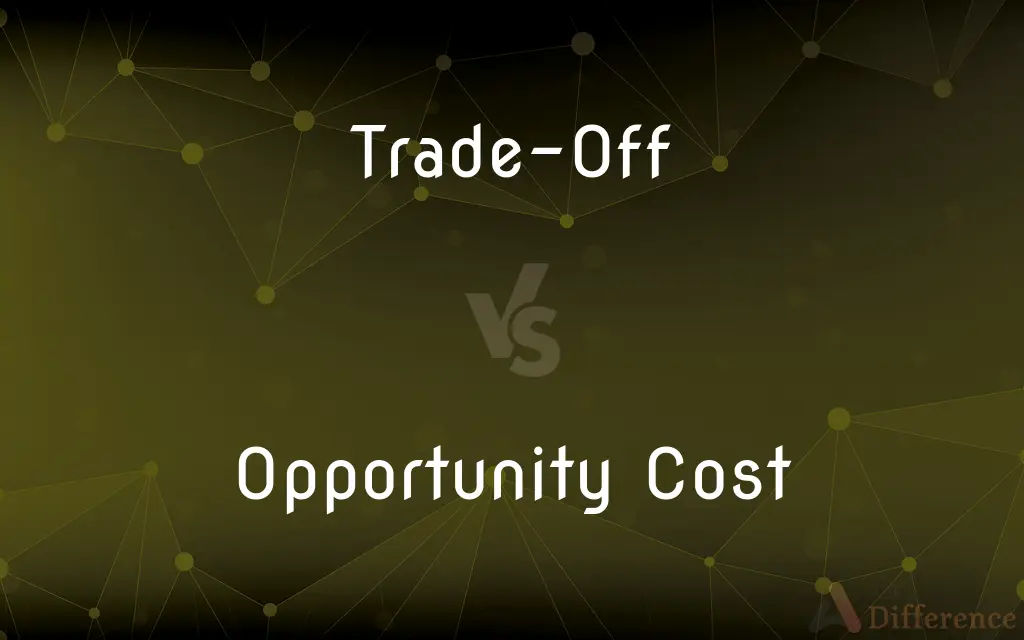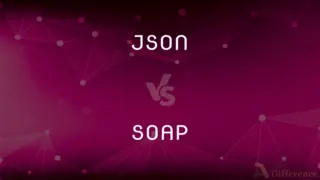Trade-Off vs. Opportunity Cost — What's the Difference?
Edited by Tayyaba Rehman — By Fiza Rafique — Published on January 7, 2024
Trade-Off is choosing one thing over another. Opportunity Cost is the value of the next best alternative forgone.

Difference Between Trade-Off and Opportunity Cost
Table of Contents
ADVERTISEMENT
Key Differences
Trade-Off and Opportunity Cost are foundational economic concepts. A Trade-Off implies a decision to choose one option over another, weighing the benefits and drawbacks of each choice. Opportunity Cost, on the other hand, refers to the value of the next best alternative that you give up when making a decision.
In every decision we make, there's a Trade-Off. Whether it's spending money, time, or other resources, we're choosing one thing over another. On the flip side, Opportunity Cost is always lurking in the background of our decisions. It represents the benefits we could have enjoyed had we chosen a different path.
Let's think of a student deciding to work instead of attending college. The Trade-Off is between earning money now versus pursuing an education. The Opportunity Cost for her might be the potential higher salary and career opportunities she might miss by not getting a degree.
When considering investments, businesses often weigh the Trade-Off of putting money into one project versus another. The Opportunity Cost, in this case, could be the potential returns they could have earned from the project they didn't choose.
In essence, while Trade-Offs are about making choices between competing options, Opportunity Cost is about understanding the implications of those choices in terms of missed opportunities.
ADVERTISEMENT
Comparison Chart
Definition
Choosing one thing over another.
Value of the next best alternative.
Focus
Decision-making process.
Missed benefits of foregone choice.
Perspective
Present choices.
Potential future outcomes.
Example Situation
Buying a car vs. a vacation.
Enjoyment lost by not taking vacation.
Relationship
Direct result of choices.
Indirect result of choices.
Compare with Definitions
Trade-Off
An exchange where benefits of one aspect are given up to advance another.
The city made a trade-off by developing parks at the expense of parking spaces.
Opportunity Cost
The value of the next best alternative forgone.
Her opportunity cost of attending the concert was missing a day's pay at work.
Trade-Off
A decision that involves prioritizing one factor over another.
The company faced a trade-off between increasing wages or hiring more staff.
Opportunity Cost
The unseen cost associated with forgoing a potential benefit.
The company's opportunity cost of not innovating is losing market share.
Trade-Off
A situation wherein one thing is lost in pursuit of gaining another.
The trade-off of staying late at work was missing his son's soccer game.
Opportunity Cost
The benefits missed when choosing one avenue over another.
Studying instead of partying has the opportunity cost of missed social interactions.
Trade-Off
A balance achieved between two conflicting features or elements.
Buying a smaller car was a trade-off between fuel efficiency and space.
Opportunity Cost
The loss of potential gain from alternatives when one option is chosen.
Spending his savings on a new phone meant the opportunity cost was not investing that money.
Trade-Off
A compromise between two desirable outcomes.
There's a trade-off between quality and quantity in production.
Opportunity Cost
A representation of what is sacrificed to get something else.
His opportunity cost of buying the luxury car was not taking multiple vacations.
Trade-Off
An exchange of one thing in return for another, especially relinquishment of one benefit or advantage for another regarded as more desirable
"a fundamental trade-off between capitalist prosperity and economic security" (David A. Stockman).
Trade-Off
Any situation in which the quality or quantity of one thing must be decreased for another to be increased.
In writing, there's often a trade-off between being concise and being complete.
Trade-Off
An exchange that occurs as a compromise;
I faced a tradeoff between eating and buying my medicine
Common Curiosities
What is a Trade-Off in simple terms?
A Trade-Off is choosing one thing over another.
Is the concept of Opportunity Cost always monetary?
No, Opportunity Cost can be time, happiness, or any other valuable factor.
Can two options have the same Opportunity Cost?
In theory, yes, but in practice, every choice often has a unique Opportunity Cost.
Why do businesses care about Trade-Offs?
Trade-Offs help businesses prioritize resources and make effective decisions.
Are Trade-Offs always clear-cut decisions?
No, some Trade-Offs require careful consideration and are not always obvious.
How does Opportunity Cost relate to Trade-Off?
Opportunity Cost is the value of the next best choice you give up due to a Trade-Off.
Why are Trade-Offs important in economics?
Trade-Offs highlight the decisions and sacrifices made to allocate scarce resources.
How do Trade-Offs affect consumer behavior?
Consumers weigh Trade-Offs to decide which product or service offers the best value.
How can I calculate my Opportunity Cost?
Evaluate the benefits of the next best alternative to your chosen option.
Can there be a Trade-Off without an Opportunity Cost?
No, every Trade-Off has an associated Opportunity Cost.
Does Opportunity Cost change over time?
Yes, as circumstances and values change, so can Opportunity Cost.
Can Opportunity Cost be zero?
Theoretically, if the value of the next best alternative is the same as the chosen one, the Opportunity Cost is zero.
Are Trade-Offs only about loss?
No, Trade-Offs are about balance; they involve both giving up and gaining something.
Can personal decisions have Trade-Offs and Opportunity Costs?
Absolutely, everyday decisions, like how to spend time, involve Trade-Offs and Opportunity Costs.
Is a higher Opportunity Cost always bad?
Not necessarily. A higher Opportunity Cost might reflect a valuable choice made.
Share Your Discovery

Previous Comparison
JSON vs. SOAP
Next Comparison
Fable vs. Fairy TaleAuthor Spotlight
Written by
Fiza RafiqueFiza Rafique is a skilled content writer at AskDifference.com, where she meticulously refines and enhances written pieces. Drawing from her vast editorial expertise, Fiza ensures clarity, accuracy, and precision in every article. Passionate about language, she continually seeks to elevate the quality of content for readers worldwide.
Edited by
Tayyaba RehmanTayyaba Rehman is a distinguished writer, currently serving as a primary contributor to askdifference.com. As a researcher in semantics and etymology, Tayyaba's passion for the complexity of languages and their distinctions has found a perfect home on the platform. Tayyaba delves into the intricacies of language, distinguishing between commonly confused words and phrases, thereby providing clarity for readers worldwide.
















































